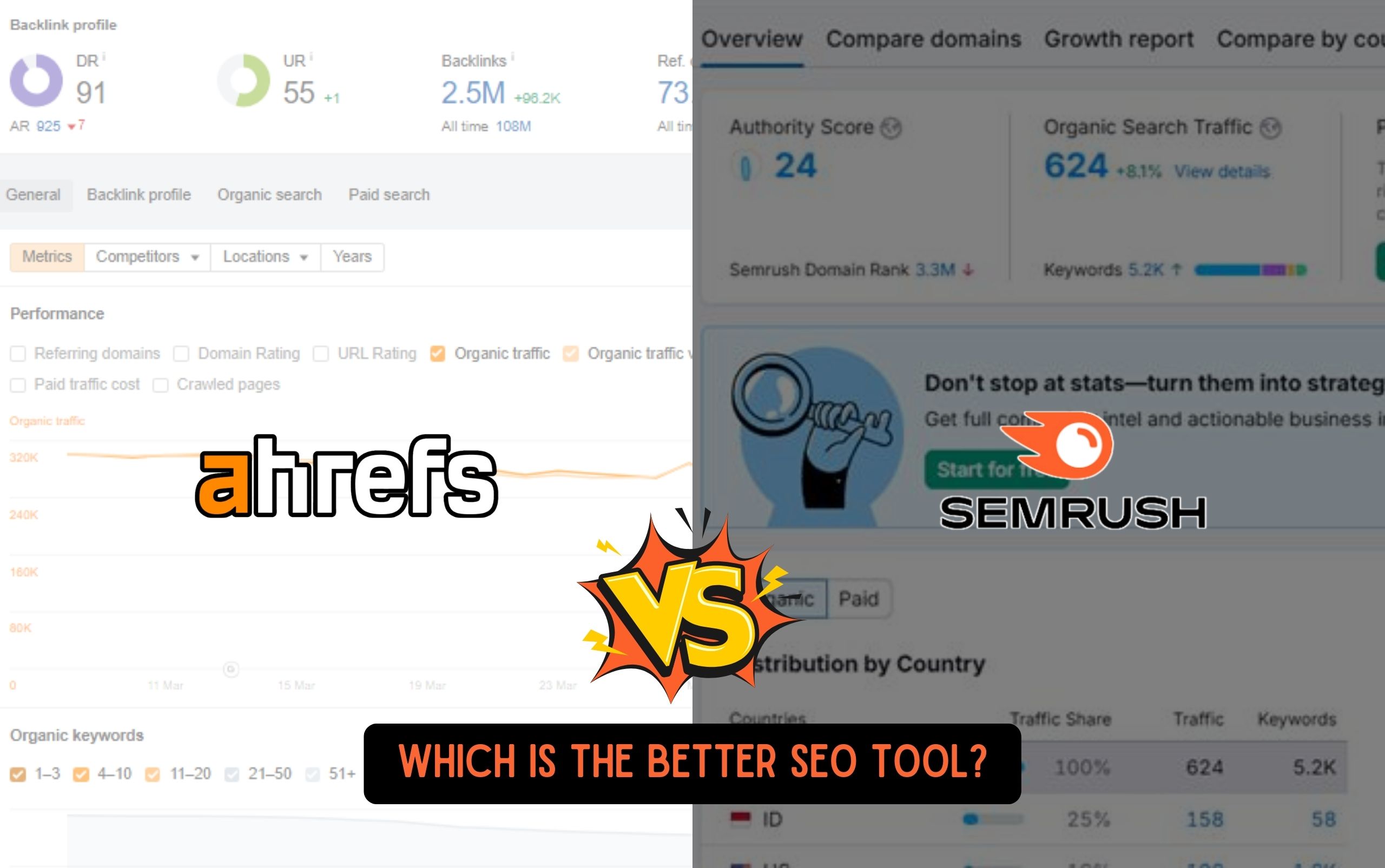SEO Services in Chichester: Choosing the Right Partner
Apr 11, 2025

Apr 11, 2025

Apr 08, 2025

Mar 29, 2025

Mar 29, 2025

Mar 29, 2025

Mar 29, 2025

Mar 27, 2025

Mar 27, 2025
Sorry, but nothing matched your search "". Please try again with some different keywords.


In this blog, I’m going to do a comprehensive Ahrefs vs. Semrush comparison. Of course, I’ll be writing from my experience with both tools and how to compare them against the most significant parameters.
These parameters include:
So, if you are seeking a detailed comparison of the two most popular optimization tools, you have arrived at the right place!
Let’s go!

I’ve included Semrush—a completely operational digital marketing software platform with a primary focus on keyword research and overall SEO—in the blue corner.
It is vital to be aware of how Semrush began its journey as an SEO tool —and how the software suite’s priorities have remained the same until today.
Currently, you can depend on Semrush for:
Similarly, I’ve Ahrefs—one of the best tools for doing backlink analysis—in the red corner. Over the past few years, Ahrefs has added multiple features, making the whole Ahrefs vs. Semrush comparison a possibility.
While Ahrefs’ only priority was links a few years back, the tool has evolved into becoming a major competitor of Semrush.
Currently, you can use Ahrefs for:
As a result, both Semrush and Ahrefs have very similar features. So, it is time to ask: which is the best SEO tool in 2025?
Let’s find out!
First, I tried to find the best tool for finding new keywords. So, let’s see who made it to the top.
You can check the keywords your competition ranks for in real time with Semrush. While it might appear to be a similar feature to Ahrefs, there are certain differences. For instance, they have various methods of finding out how much traffic a website can get from its ranking on the first page.
The best thing about using Semrush for keyword research is that it can help you obtain comprehensive keyword data in a report. Also, the tool’s AI-driven features can give you more data to make decisions.
Moreover, Semrush analyzes content relevance and quality, helping users anticipate how their content will perform in SERPs.
Also, the best metric for the tool is PKD% or Personal Keyword Difficulty. It offers tailored keyword difficulty numbers, specifically for a website domain, making them relevant to your situation. This means you can choose keywords for your domain that you can easily rank for.
So, Ahrefs has two primary features for doing keyword research:
The feature is similar to most keyword tools – you just type in keywords and get an entire list of ideas for relevant keywords. The unique thing about this feature is that Ahrefs doesn’t highlight search volume but still shows the data on the same page. Also, this tool will help you determine the number of clicks you might get if you rank for the keyword.
Additionally, Ahrefs’ keyword feature allows users to improve the results and obtain hundreds of keyword ideas. Also, you can use the organic keywords feature to reverse engineer competing websites.
Overall, Semrush emerges as the winner. While Ahrefs has a smoother user interface, Semrush offers users more data on PPC and SEO, making it a more effective keyword tool.
Secondly, I tried to find which tool’s backlink analysis feature was better. A few years ago, I compared Semrush vs. Ahrefs in terms of their backlink analysis. As per my analysis, I found that both tools were tied virtually.
So, let’s find out which tool will be able to help you find the most backlinks.
For this small test, you can use your personal or business blog. I used this particular blog, and my findings indicated that Semrush had a bigger link index in terms of total backlinks. As a result, it is obvious that Semrush has been investing seriously in its vast link database—and naturally, the specific feature for backlink analysis.
That being highlighted, you also need to know that the link index’s size is only one factor to consider.
For instance, the user interface also plays a crucial role.
So, if you can access all that you require without clicking much, that’s huge! After all, doesn’t link building take a lot of time? You definitely do not want to take even more time just because you are using a difficult tool.
For instance, I am a fan of Ahrefs’s ability to enable users to preview the content that appears in relation to each backlink.
As a result, it becomes easy to understand why users opt to link to a particular page. Now, in a sudden twist of events, Semrush has also launched a similar feature for its link database.
Personally, I find it easier to use Ahrefs for backlinking. The best part? It takes only a few clicks to check out the best links on a page, the pages with the most links, and so much more.
This was very tough! However, after much debate, I must point out that both tools are tied to backlink analysis. So, while Semrush’s recently expanded link index has expanded, not to mention its superior user interface, I love using Ahrefs’s user interface since it is easy, especially when analyzing a website’s link profile.
Thirdly, I’ll check out each tool’s technical audit feature. In the Ahrefs vs. Semrush comparison, let’s see who emerges as a winner when it comes to solving technical SEO issues.
Like the backlink analysis feature, I checked my website on each tool to measure the quality of their technical audit features. So, let’s find out what happened after…
Semrush’s website audit feature is solid. Yes, you can easily obtain an excellent health score for a generic, overall idea about your website’s SEO friendliness. This holds true, especially in the technical SEO domain.
Moreover, Semrush also helps users with information about SEO problems on their websites in terms of:
In addition, the feature can also help users find the list of activities that they need to work on immediately.
Also, Semrush has another cool feature—A.K.A. internal link distribution—that displays a report on how well you have set up the internal links for SEO. Generally, best SEO practices highlight how users prefer internal linking from high-authority web pages to low-authority web pages in need of a good authority score.
I was checking out a popular website in the SEO industry. As per Ahrefs, it had an excellent health score of 81%. This was significantly based on the website’s ‘no-index’ tag for over 300 pages.
This is not an issue since it is better to add this tag to the pages that a user doesn’t want the search engine to index.
So, it is difficult to agree with Ahref’s point that this is a major problem. Yes, it can be a problem – a problem that you can add to your ‘things to check out’ list. However, the tool makes adding this issue to the activities that can influence your overall health score imperative.
Moreover, the tool also pointed out issues such as meta descriptions that needed fixing and slow-loading pages.
For me, these are problems that need fixing. So, it was great to see that this tool found them. Sadly, the tool tends to bury these problems under ‘issues’ such as 301 redirects and no-index tags.
So, Semrush emerges as the clear winner in the technical SEO department. Its website audit features are relatively more solid, and it does a much better job of determining where to act first.
Both Semrush and Ahrefs have rank-tracking features. So, let’s find out which tool is the winner.
Like most rank trackers, this tool regularly tracks where a user’s website ranks on Google Search for a particular range of keywords.
Semrush has more features than Ahrefs. For instance, this tool has an excellent visibility score. Moreover, Semrush also updates the tracked keywords regularly. In comparison, Ahrefs does it only twice or even once a week – it entirely depends on what pricing plan you opt for!
So, if you prefer staying on top with changes in ranking, then weekly updates might not help.
Moreover, Ahrefs also has an excellent rank-tracking feature. In fact, I checked several keywords, and the ranking was accurate according to Ahref’s data. So, there’s not much to talk about in this case.
While comparing Ahrefs vs Semrush, it appears that Semrush is the winner regarding rank tracking. Both tools are good at what rank trackers typically do – monitor your rankings. However, Semrush boasts relatively more solid features and regular updates.
While the other points on this list featuring the Ahrefs vs Semrush comparison are crucial, for many working professionals, the quality of support each tool offers also plays a vital role.
As a result, it was only natural to consider the quality of support each tool offers. To find out the same, I sent the same question to the support team of both tools:
“Hello. I was wondering how to find out a keyword’s search volume. Do I have to take data from Google’s Keyword Planner or some other source?”
Now, this was a simple query—not something basic like ‘How to create my account?’ or ‘How to change my password?’
So, let’s find out how each tool performs.
In Ahrefs, I clicked on the chat button that kept appearing in the bottom right corner of my screen. It was pretty easy!
I loved that submitting my query took me only a few seconds. Within only 10 minutes, I received a helpful response—nice, right?
In comparison, Semrush’s support was very similar—just like Ahrefs, Semrush offered a similar experience. Not only that, but Semrush is also pretty good with its response rate.
In this aspect, it is obvious that both tools offer similar quality of support—so who is the winner? In this case, both Semrush and Ahrefs offer excellent support.
In this case, I could compare the primary features of both Semrush and Ahrefs. Now, let’s check out the unique features of both tools:
Semrush boasts more than one cool feature that is missing from Ahrefs.
The best one is the tool’s complete paid suite for search and optimization. Ahrefs has limited features for PPC.
Semrush has several PPC-related features that can help you maximize Google Ads and paid marketing campaigns. Also, if you are doing local SEO, Semrush has a listing feature that helps users set up their NAPs accurately.
Moreover, it also helps users find any NAP opportunity they might have missed.
Another unique feature of Semrush is its AI assistant, Copilot. This feature can read data from a user’s Semrush reports and offer intelligent alerts and suggestions to boost their SEO strategy.
Personally, I think the only unique feature of Ahrefs is Content Explorer. Now, if you have used tools like BuzzSumo in the past, then you already know what I am getting at!
However, for those who have yet to find out, you can type in the topics you want to write on, and Ahrefs can help you determine their performance potential. This information includes social shares, backlinks, and so much more.
Also, Ahrefs has certain mini features that I am prone to using most of the time—these are features that only a handful of tools in the market seem to have.
For instance, I have used Ahrefs several times to build broken links. That is simply because it is SO easy to find broken links with Ahrefs—internal and external. Moreover, this simple feature saves a lot of time.
The overall winner is Semrush when it comes to unique features. To be honest, both Semrush and Ahrefs have some of the most unique features in the industry. However, Semrush’s unique features, especially its PPC software, are perfect for any business running campaigns.
I’ve used Ahrefs and Semrush since 2019. I’ve been happily paying for both tools for the past 6 years because they complement each other.
So, while choosing a winner in the Ahrefs vs Semrush comparison, I considered several factors, such as:
It was a really hard decision, but for me, the winner is Ahrefs. Its easy user interface and attention to detail when it comes to research make it a clear winner. While Semrush is equally good, I think it is difficult for beginners to use.
You can’t go wrong with either of these tools, but if you have to stick to a budget and are just starting, opt for Ahrefs!
Barsha Bhattacharya is a senior content writing executive. As a marketing enthusiast and professional for the past 4 years, writing is new to Barsha. And she is loving every bit of it. Her niches are marketing, lifestyle, wellness, travel and entertainment. Apart from writing, Barsha loves to travel, binge-watch, research conspiracy theories, Instagram and overthink.
View all Posts
SEO Services in Chichester: Choosing the Righ...
Apr 11, 2025
Why Headless CMS Works Well for EdTech Startu...
Mar 29, 2025
Building Topical Authority to Excel in Search...
Mar 29, 2025
The Impact of Professional Recruitment Servic...
Mar 29, 2025
The 13 BEST Quillbot Alternatives In The Mark...
Mar 29, 2025

